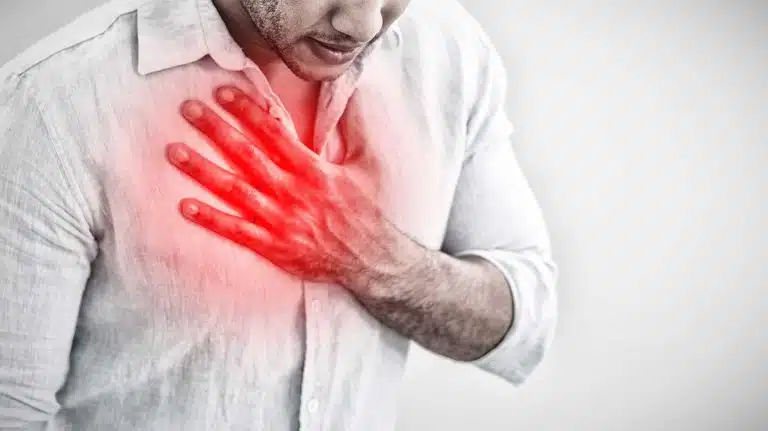Alcohol And Heartburn | What You Need To Know
- What Is Heartburn?
- Does Alcohol Use Cause Heartburn?
- How Does Alcohol Cause Heartburn?
- Alcohol-Related Heartburn Treatment

Excessive alcohol use can negatively impact numerous organs and bodily systems. One of the possible adverse effects of alcohol includes heartburn. Alcohol may also worsen symptoms of digestive disorders, such as gastroesophageal reflux disease (GERD).
What Is Heartburn?
When you eat or drink something, it travels from your mouth to your stomach through your esophagus.
At the bottom of the esophagus is a muscle known as the lower esophageal sphincter (LES). This muscle relaxes when you swallow to allow food and drink to pass through into the stomach.
When this muscle doesn’t tighten back up, stomach acid can travel up into the esophagus. This can cause acid reflux, which can result in a burning sensation in your throat or chest. This pain is known as heartburn.
Gastroesophageal Reflux Disease (GERD)
Occasional heartburn is common and can be brought on by certain medications, foods, and drinks, including alcohol. If acid reflux occurs frequently, it may indicate a chronic disorder such as gastroesophageal reflux disease (GERD).
Symptoms of GERD can include:
- heartburn
- chest pain
- nausea
- regurgitation of food or drink
- bitter taste in mouth
- difficulty swallowing
Does Alcohol Use Cause Heartburn?
Everyone is different but there are some common foods and drinks that can trigger symptoms of heartburn, including alcohol.
Along with alcoholic drinks, common heartburn triggers include:
- acidic foods (citrus fruits or tomatoes)
- chocolate
- fatty foods
- peppermint
- spicy foods
- coffee or soda
Late-Night Eating
Drinking alcohol can lower inhibitions, which increases the risk of consuming foods that may disagree with you. You may also be more likely to eat late at night and lay down soon after eating, both of which can contribute to heartburn.
Beer, Wine, & Cigarette Smoking
Other risk factors for alcohol-related acid reflux include carbonated alcoholic beverages and cigarette smoking. According to a 2010 review, beer, red wine, and white wine are associated with the highest risk of increased stomach acid.
How Does Alcohol Cause Heartburn?
Although alcohol may cause heartburn in some people, research is inconclusive on its relationship to GERD. However, the majority of researchers agree that alcohol use may worsen symptoms of GERD and acid reflux.
Alcohol As An Irritant
Alcohol comes in direct contact with your throat, esophagus, and stomach. This can cause irritation of these organs and eventually lead to heartburn, nausea, or vomiting. Frequent alcohol consumption may cause damage to the esophagus or inflammation of the stomach lining.
Increased Stomach Acidity
Alcohol may also contribute to abnormal functioning of the muscles in the esophagus and increase stomach acidity. This can make it more difficult for your body to keep food down. It also increases the risk of stomach acid rising into your esophagus, causing heartburn.
Alcohol-Related Heartburn Treatment
If alcohol is contributing to heartburn, abstinence from alcoholic drinks may improve symptoms. Medical detox can help you safely through the alcohol withdrawal process. Once your body has healed from alcohol withdrawal, you may not need to treat heartburn any further.
However, one research study found some people continued to experience symptoms after they stopped drinking.
Along with abstinence from alcohol, the following lifestyle changes may improve heartburn symptoms:
- diet changes
- quitting smoking
- waiting to lie down after eating
- medications
Over-the-counter (OTC) medications are usually sufficient for occasional or mild heartburn. For more severe cases, a doctor may prescribe a stronger medication.
OTC Medications
A variety of OTC medications are available to treat heartburn that includes antacids, H2 receptor blockers, and proton pump inhibitors (PPIs).
Antacids
Antacids (like Tums) neutralize stomach acid and can offer nearly immediate relief. You can usually find these in the form of dissolving or chewable tablets.
H2 Blockers
H2 blockers (like Pepcid AC) reduce stomach acid but take more time than antacids to improve symptoms. Although they take longer to work, their effects may last longer than antacids.
Proton Pump Inhibitors
Proton pump inhibitors (like Prilosec OTC) are the strongest form of OTC medications for heartburn. They stop acid production in your stomach and can heal a damaged esophagus, which can be beneficial for chronic heartburn.
Prescription Medications
Both H2 blockers and proton pump inhibitors are available in prescription strength. Baclofen is a prescription muscle relaxer that may improve the functioning of muscles in the esophagus.
Alcohol can have many serious adverse health effects. If you or a loved one is suffering from alcohol addiction, help is available. Contact us today to speak with a specialist about treatment options.
Written by Ark Behavioral Health Editorial Team
©2024 Ark National Holdings, LLC. | All Rights Reserved.
This page does not provide medical advice.
American College Of Gastroenterology - Acid Reflux
Journal of Zhejiang University Science - Is Alcohol Consumption Associated With Gastroesophageal Reflux Disease?
Mayo Clinic - Gastroesophageal Reflux Disease (GERD)
Mayo Clinic - Heartburn
National Library Of Medicine - Tobacco Smoking, Alcohol Consumption, And Gastroesophageal Reflux Disease

Questions About Treatment?
Ark Behavioral Health offers 100% confidential substance abuse assessment and treatment placement tailored to your individual needs. Achieve long-term recovery.
100% confidential. We respect your privacy.
Prefer Texting?
Our friendly support team is here to chat 24/7. Opt out any time.







 Learn More
Learn More








